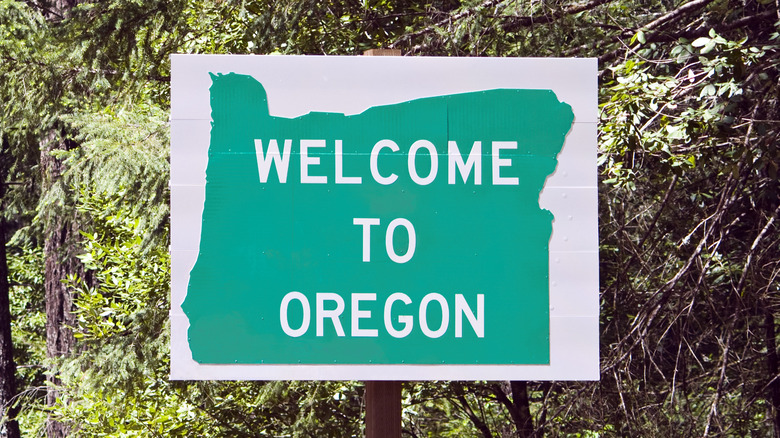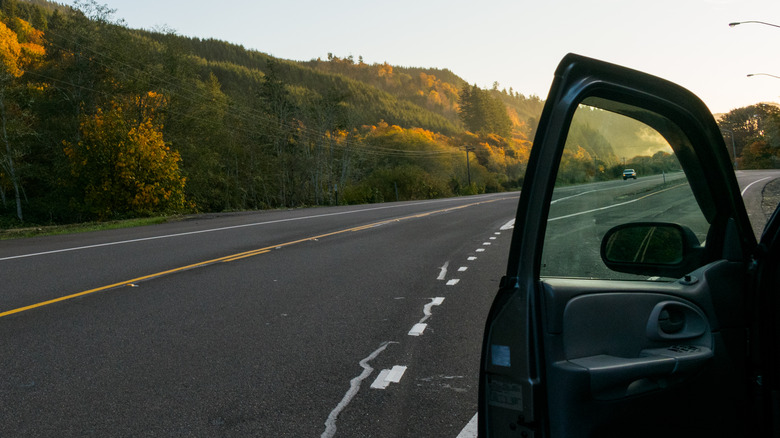Weirdest Laws In Oregon's State History
The state of Oregon is located in the Pacific Northwest of the United States, which is a far western region of the country that also includes the state of Washington, and to an extent, Idaho, California, and Alaska, per Visit the USA. As its name suggests, most of these states share a border with the Pacific Ocean and are as far north and west as you can get.
Oregon became the 33rd state in 1859, says History. Nicknamed the "Beaver State" for its high population of beavers (says Oregon Wild), Oregon is also very well known for its high population of llamas and llama owners (via Lama Registry). The state is also home to Crater Lake, the deepest lake in the U.S. and one of the deepest in the world (says National Park Service). Elsewhere, it houses the tallest barber pole in the world in the small city of Forest Grove.
Oregon has a population of over 4.2 million residents and includes the region's second-largest city, Portland, which is the state's largest city and where the majority of its population is centered. These people are governed by the Oregon state legislature, which over the years has produced some sound laws ... and some weird ones.
Hunting on burial grounds
Hunting is considered a leisure sport in many places, but hunters don't just have to take heed of hunting season — they also have to be cautious of where they decide to hunt.
For instance, say you go hunting, and the animal you're on the hunt for somewhat escapes and ends up in a cemetery. It's natural to go after it, right? But by entering a cemetery to hunt, you'd be committing a crime in Oregon. As one of the state's public order laws, it is illegal to hunt in a cemetery, and if you do, you will end up with a misdemeanor on your record. You might even get slapped with a $5,000 fine, says Kitsap Sun.
But there's more — apparently, you can't hunt (or trap) on any grounds that are in city parks, public parks, or school property (per ORS 498.158). Naturally, all of this would seem like common sense to the average person, especially a hunter, who likely prefers and knows to hunt far away from the public eye. It's weird to imagine someone even wanting to hunt at a cemetery not knowing what visitors are there, not to mention the fact that many cemeteries are gated.
Human waste throwing
As gross as it is, it seems like enough people threw urine or feces somewhere in Oregon at some point, which led to state legislators coming up with this law. Per OregonLaws, not properly getting rid of human waste comes with punishment. Of course, nature calls are natural for every living being, but humans particularly have a way of disposing of it, and the use of toilets eliminates 99% of that. But what makes this law quite weird is the specificity that comes with it. It's not just the throwing of pee or poop somewhere — it's doing it from a moving car that's driving on a highway. So if you get caught throwing literal crap from your vehicle on any Oregon highway or just leaving urine in a container near there, you can be charged with a misdemeanor.
What makes this law even weirder is that it appears that the act is perfectly fine as long as you're not doing it from a car.
No strength-testing on Oregon highways
Laws nearly everywhere in the U.S. don't support dangerously high speeds, and as a result, one can lose their license or pay serious fines in every state for speeding. In Oregon, that is all true, along with something else — the state doesn't want anyone using their highways to get their car race on. But somewhere in the middle of listing all the variations of offensive vehicular speeding and racing, legislators snuck in a weird rule. Per OregonLaws, testing your physical endurance on their highways is an offense.
The law makes it an offense to drive "a vehicle or participates in any manner in any of the following in which a vehicle is involved" and then names "a test of physical endurance." But performing a test of one's strength often excludes a vehicle, which makes the law a bit strange. Unless some Oregonians in the past just so happened to get caught having arm wrestling competitions inside their cars. Or maybe someone was busted doing push-ups atop a car? The only plausible answer that would somewhat help this law seem less weird is a vehicle pulling contest like the one's the World's Strongest Man holds. But those events don't seem to be happening on highways, let alone in Oregon. Either way, it's not exactly clear what example the law is criminalizing, but if someone were to tie a rope and try to pull a car on a state highway, they'd likely get in trouble.
Open car doors
Whether you're a passenger or a driver, the act of being either means you have to open and close a car door. But did you know in Oregon, if you don't follow a set of rules when it comes to opening a car's door, you can get hit with a traffic violation? It's likely to promote common sense and consideration and ensure drivers and passengers look out for traffic before opening their doors. But Oregon lawmakers also had something else in mind when laying out the law about car door-opening — there's a law stating that with precautions, you are allowed to open your car door on the roadside, bike lane, or sidewalk (via Oregon Laws). However, if you leave your car door open for too long, you will get penalized. The law states leaving a door open "longer than necessary" to get in or get out is an offense.
However, what the law doesn't state is how much time a car door can stay open before it's considered a violation. What if you have to vomit? Or what if you're getting groceries out of your car, and it requires multiple trips back and forth? Basically, how long is too long?
No fortune telling in this Oregon city
People have been trying to tell the future for hundreds of years. Not everyone believes in it, but there are many who do and live by it. But fat chance if you live or happen to visit the city of Yamhill, Oregon. The small farming town with a population of less than 1,200 bans all forms of occult arts. The city's legislation (via Q Code) defines that as anything related to astrology, fortune-telling, palmistry, and anything spiritual wherein a conclusion is made about someone or something without being backed by science. This means that if you wanted to go do a palm reading, have an astrologer discuss your sun and moon signs, or pay a visit to a medium in Yamhill, you'd more than likely you'd be out of luck. But most of all, you'd be committing a crime.





